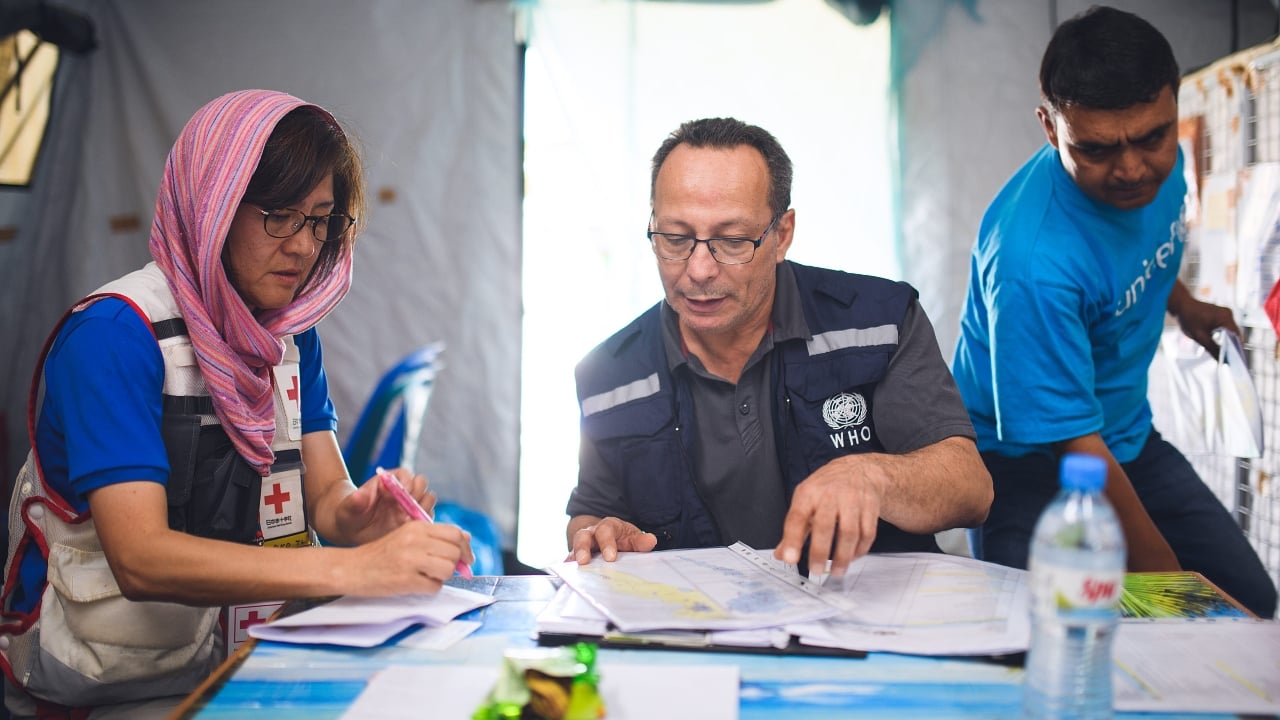

Featured
WHO Health Definition
Modified: January 2, 2024
Discover the comprehensive WHO health definition and explore featured topics in our informative collection. Take charge of your well-being today!
Introduction
When discussing the concept of health, it is important to have a clear and universally accepted definition. Health is a multifaceted term that encompasses not only physical well-being but also mental and social aspects. Defining health not only helps us understand its significance but also guides us in our pursuit of a healthier lifestyle.
In this article, we will delve into the definition of health as provided by the World Health Organization (WHO), an influential global authority in the field of public health. We will explore the importance of having a comprehensive definition and examine the implications of WHO’s definition in various contexts.
The understanding of health has evolved over time, from a narrow focus on physical ailments to a broader perspective that recognizes the interconnectedness of different aspects of well-being. Today, we acknowledge that health is not merely the absence of disease but a state of complete physical, mental, and social well-being.
Having a clear definition of health has several benefits. Firstly, it serves as a guiding principle for healthcare professionals, policymakers, and individuals seeking to improve their well-being. By providing a framework for understanding health, it enables targeted interventions and promotes a holistic approach to healthcare.
Secondly, a universally recognized definition of health fosters consistency and facilitates communication in the field of health promotion and disease prevention. It allows researchers, practitioners, and policymakers from different countries and disciplines to align their efforts and collaborate effectively.
One of the most widely accepted definitions of health is provided by the World Health Organization (WHO), an agency of the United Nations that specializes in international public health. The WHO’s definition has played a pivotal role in shaping the understanding of health globally.
Next, we will explore the WHO’s definition of health, critically evaluate its strengths and limitations, and analyze its implications in various contexts.
What is Health?
Health is a complex notion that encompasses multiple dimensions of well-being. It goes beyond the absence of disease and reflects a state of complete physical, mental, and social well-being. Simply put, health is not just about being free from illness but being able to thrive and lead a fulfilling life.
The physical aspect of health refers to the body’s ability to function optimally. It involves factors such as maintaining a healthy weight, having good cardiovascular health, and having a strong immune system. Physical health is crucial for performing daily activities, preventing diseases, and enjoying a high quality of life.
Mental health is equally important and relates to a person’s emotional and psychological well-being. It encompasses aspects such as the ability to cope with stress, maintain positive relationships, and engage in meaningful activities. Mental health plays a vital role in overall well-being and affects how individuals think, feel, and act in their daily lives.
Social health focuses on the individual’s interactions and relationships with others. It involves having a supportive network of family and friends, experiencing a sense of belonging in communities, and engaging in positive social interactions. Social health is crucial for maintaining emotional well-being, creating a sense of connection, and fostering personal growth.
These dimensions of health are interconnected and influence one another. For example, poor physical health can negatively impact mental well-being, and vice versa. Similarly, a lack of social connections can lead to feelings of loneliness and can affect both physical and mental health.
It is important to note that health is not a static state but a dynamic process that evolves over time. It is influenced by various factors, including genetics, lifestyle choices, social and economic conditions, and the environment. Each person’s experience of health is unique and influenced by their individual circumstances.
Furthermore, health is not solely determined by the absence or presence of disease. It also encompasses factors like resilience, adaptability, and the ability to cope with challenges. Health is a continuum, with individuals ranging from optimal well-being to experiencing varying degrees of illness or disability.
Overall, health is a comprehensive concept that encompasses physical, mental, and social well-being. It is more than just the absence of disease and involves maintaining a balance across multiple dimensions of life. Understanding the complexities of health is crucial for promoting well-being and improving the overall quality of life.
The Importance of Defining Health
Having a clear and universally accepted definition of health is critical for numerous reasons. It provides a foundation for understanding and addressing the diverse needs of individuals and populations. Here are some key reasons why defining health is essential:
Guiding Healthcare and Policy: A well-defined concept of health serves as a guiding principle for healthcare providers and policymakers. It helps them set goals and prioritize interventions that promote overall well-being. With a clear definition, healthcare professionals can focus on preventive care, early detection, and comprehensive treatment of diseases.
Promoting Holistic Approach: By encompassing physical, mental, and social well-being, a comprehensive definition of health promotes a holistic approach to healthcare. It recognizes the interplay between different dimensions of well-being and encourages the integration of services that address each aspect. This approach acknowledges that health is not just about treating physical ailments but also includes mental and social aspects.
Empowering Individuals: Defining health empowers individuals to take charge of their well-being. When people understand what health entails, they can make informed choices and adopt preventive measures. It encourages individuals to lead healthy lifestyles, seek appropriate healthcare, and prioritize their overall well-being.
Addressing Health Disparities: Health definitions can play a crucial role in addressing health disparities. They can shed light on social determinants of health, such as poverty, education, access to healthcare, and social support networks. A clear definition allows policymakers to identify and target these disparities, ensuring that everyone has an equal opportunity to achieve optimal health.
Facilitating Communication and Collaboration: A universally accepted definition of health fosters consistent communication and collaboration among healthcare professionals, researchers, policymakers, and various stakeholders. It provides a common language and understanding, enabling effective knowledge exchange, research collaboration, and joint efforts towards improving population health.
Creating Accountability: Defining health creates accountability at various levels. It holds governments accountable for their role in fostering healthcare systems that promote well-being. It encourages healthcare providers to deliver quality care while considering all dimensions of health. Individuals, too, are held accountable for taking responsibility for their own health and making choices that contribute to their overall well-being.
With the importance of defining health well-established, it is essential to have a definition that is comprehensive, inclusive, and adaptable to different contexts. The World Health Organization’s definition of health has been a significant milestone in shaping the understanding and promotion of health globally, as we will explore further in the following sections.
The World Health Organization (WHO)
The World Health Organization (WHO) is a specialized agency of the United Nations that has been at the forefront of global health since its establishment in 1948. It serves as the leading authority on international public health and plays a vital role in setting health priorities, providing technical expertise, and coordinating efforts to improve global health outcomes.
The primary goal of WHO is to promote the attainment of the highest possible level of health for all individuals and communities. It does so by providing leadership on health issues, shaping the research agenda, setting norms and standards, and advocating for health equity.
One of WHO’s key functions is to establish evidence-based guidelines and recommendations for health interventions. These guidelines are developed by expert committees and are crucial in guiding healthcare policies and practices worldwide. WHO also provides technical support to countries to implement these guidelines and improve their healthcare systems.
In addition to its technical work, WHO plays a critical role in disseminating information, raising awareness, and mobilizing resources for global health issues. It produces reliable health data, conducts research, and serves as a platform for sharing knowledge and best practices.
WHO has contributed significantly to various global health achievements, including the eradication of smallpox, the control of polio, and the reduction of maternal and child mortality. It has also been instrumental in responding to global health emergencies, such as outbreaks of infectious diseases and natural disasters.
Moreover, WHO collaborates closely with other United Nations agencies, international partners, and non-governmental organizations to address complex health challenges that require a global response. It works towards fostering collaboration and coordination among countries, ensuring that health remains high on the global agenda.
Throughout its history, WHO has demonstrated its commitment to promoting health as a fundamental right for all individuals. It has been instrumental in advocating for health equity, tackling health inequalities, and ensuring access to essential healthcare services.
Overall, the World Health Organization plays a crucial role in shaping global health policies, providing technical expertise, and coordinating efforts to improve health outcomes worldwide. Its influence extends beyond setting standards and guidelines to fostering collaboration, raising awareness, and advocating for health as a fundamental human right.
WHO’s Definition of Health
The World Health Organization (WHO) has provided a widely recognized and influential definition of health. According to WHO, health is defined as “a state of complete physical, mental, and social well-being and not merely the absence of disease or infirmity.”
This definition emphasizes that health encompasses more than just the absence of illness. It recognizes the importance of physical, mental, and social well-being in achieving optimal health. The inclusion of these three dimensions reflects a holistic approach to health that considers the interconnectedness of various aspects of well-being.
Firstly, the physical dimension of health refers to the individual’s physical well-being and the effective functioning of the body systems. It involves factors such as fitness, nutrition, disease prevention, and the absence of physical ailments. Physical health is crucial for maintaining overall well-being, enabling individuals to engage in daily activities, and reducing the risk of diseases.
Secondly, the mental dimension of health focuses on the individual’s psychological and emotional well-being. It encompasses aspects such as cognitive functioning, emotional resilience, stress management, and the ability to cope with life’s challenges. Mental health is crucial for maintaining a positive outlook, managing emotions, and experiencing a sense of fulfillment and purpose in life.
Finally, the social dimension of health emphasizes the role of social interactions and relationships in overall well-being. It involves aspects such as social support, belonging to a community, and being able to engage in meaningful relationships. Social health contributes to emotional well-being, provides a sense of connection and belonging, and enhances personal growth.
The WHO’s definition of health is comprehensive and represents a significant departure from earlier definitions that focused solely on the absence of disease. By encompassing physical, mental, and social well-being, it acknowledges the complex and multifaceted nature of health.
Moreover, this definition highlights the importance of considering health as a dynamic state that evolves over time. It recognizes that health is influenced by various factors, including genetics, lifestyle choices, social determinants, and environmental conditions. It emphasizes the need for a holistic approach to healthcare that addresses all dimensions of well-being.
Although the WHO’s definition of health has been widely accepted and influential, it is not without its critiques and limitations. In the following section, we will discuss some of the criticisms and implications of this definition in different contexts.
Critiques of WHO’s Definition
While the World Health Organization’s (WHO) definition of health has been widely accepted and influential, it also faces several critiques and limitations. Here are some of the key criticisms:
Subjectivity and Measurement: Critics argue that the subjective nature of well-being makes it difficult to measure and quantify. Unlike the absence of disease, which can be objectively assessed, the measurement of complete physical, mental, and social well-being is challenging. This subjectivity can hinder the practical application of the definition in research, policy development, and healthcare delivery.
Absence of Cultural Considerations: Some critics argue that the WHO’s definition may not adequately account for cultural variations in the understanding and perception of health. Different cultures have distinct beliefs, values, and practices related to health and well-being. The current definition may not fully capture the cultural dimensions of health, potentially leading to a lack of cultural sensitivity in healthcare policies and interventions.
Overemphasis on Well-being: Another critique is that the focus on complete well-being sets an unrealistic expectation. Many individuals may not achieve a state of complete physical, mental, and social well-being at all times. This can lead to feelings of inadequacy and contribute to the medicalization of normal human experiences and emotions. Critics argue that a more realistic and attainable definition of health would be more useful.
Social Determinants of Health: Some argue that the WHO’s definition does not sufficiently address the social determinants of health. While it recognizes the importance of social factors, such as social support and community belonging, critics contend that it does not adequately address broader socioeconomic factors that significantly impact health outcomes, such as income inequality, education, and access to healthcare. A broader definition could better encompass the social determinants of health and guide more comprehensive interventions to address health disparities.
Neglecting Spiritual Health: Critics argue that the WHO’s definition neglects the dimension of spiritual health, which is an important aspect of overall well-being for many individuals and cultures. Spiritual health involves seeking meaning, purpose, and connection to something greater than oneself. The exclusion of spiritual health in the definition may limit its applicability to diverse populations and potentially overlook an essential aspect of human experience.
While these critiques raise valid points, it is important to recognize that the WHO’s definition of health has been a significant milestone in shifting the understanding of health from a narrow disease-focused approach to a more holistic perspective. It has played a crucial role in promoting the integration of physical, mental, and social well-being in healthcare policies, research, and practice. However, ongoing discussions and debates are necessary to refine and adapt the definition to better address the complexities and evolving needs of global health.
Implications of WHO’s Definition
The World Health Organization’s (WHO) definition of health, which emphasizes complete physical, mental, and social well-being, has profound implications in various contexts. Here are some key implications of this definition:
Shifting Healthcare Focus: The WHO’s definition encourages a shift in healthcare focus from solely treating illnesses to promoting overall well-being. Healthcare providers are encouraged to adopt a more holistic approach, considering not only the physical health of individuals but also their mental and social well-being. This shift in focus promotes preventive measures, early intervention, and the integration of services to address the multiple dimensions of health.
Holistic Healthcare Delivery: The definition’s emphasis on holistic well-being has implications for healthcare delivery. It encourages the integration of primary care, mental health services, and social support systems to address the interconnected aspects of health. This approach recognizes that factors like social determinants, mental health, and social support are critical in achieving optimal health outcomes.
Health Promotion and Prevention: The definition emphasizes the importance of health promotion and disease prevention. It underscores the need for individuals, communities, and healthcare systems to engage in preventive measures to foster overall well-being. This includes promoting healthy lifestyles, advocating for health equity, and addressing social determinants of health to prevent the onset of diseases and promote positive health outcomes.
Health Equity and Social Justice: The definition highlights the importance of addressing social determinants of health, such as poverty, education, and access to healthcare. It emphasizes the need for equitable healthcare policies and interventions to ensure that everyone has an equal opportunity to achieve optimal health. This recognition of health equity and social justice requires efforts to reduce health disparities and ensure equal access to healthcare services for all individuals.
Interdisciplinary Collaboration: The WHO’s definition promotes collaboration among healthcare providers, researchers, policymakers, and stakeholders from various disciplines. It recognizes that addressing the complexity of health requires expertise from multiple fields, including medicine, public health, psychology, and sociology. This interdisciplinary collaboration fosters a comprehensive understanding of health and facilitates the development of innovative solutions to address the diverse needs of individuals and populations.
Empowering Individuals and Communities: The definition of health empowers individuals and communities to take an active role in their own well-being. It encourages people to make informed decisions, adopt healthy lifestyle choices, seek appropriate healthcare, and engage in activities that promote their overall well-being. It recognizes that health is influenced not only by individual choices but also by the social and environmental contexts in which people live.
The WHO’s definition of health has played a significant role in shaping the understanding and promotion of health worldwide. Its implications extend beyond healthcare systems to social policies, research agendas, and individual behaviors. However, ongoing discussion, evaluation, and refinement of the definition are necessary to address its limitations and adapt it to the evolving needs of global health.
Conclusion
The concept of health is multifaceted, encompassing physical, mental, and social well-being. Defining health is crucial for guiding healthcare practices, policy development, and individual decision-making. The World Health Organization’s (WHO) definition of health, which emphasizes complete physical, mental, and social well-being, has significantly influenced the global understanding of health.
A clear and comprehensive definition of health serves as a guiding principle for healthcare professionals, policymakers, and individuals seeking to improve well-being. It promotes a holistic approach that integrates physical, mental, and social aspects of health. The WHO’s definition has sparked a shift in healthcare focus, encouraging preventive measures, early intervention, and the integration of services to address the multiple dimensions of health.
The implications of the WHO’s definition are far-reaching. It underscores the importance of health promotion, disease prevention, and addressing social determinants of health. It calls for equitable healthcare policies, interdisciplinary collaboration, and empowering individuals and communities to take an active role in their well-being.
However, the WHO’s definition also faces critiques and limitations. The subjectivity of well-being, cultural considerations, and the exclusion of certain dimensions like spirituality raise important questions. Ongoing discussions and refinement are necessary to address these criticisms and adapt the definition to better represent diverse perspectives and needs.
In conclusion, the WHO’s definition of health provides a foundation for understanding and promoting well-being. It emphasizes the interconnectedness of physical, mental, and social aspects of health, guiding healthcare practices, policies, and individual actions. While it may have its limitations, the definition has played a significant role in shaping global health perspectives and fostering a holistic approach to improving the overall quality of life for individuals and communities.









